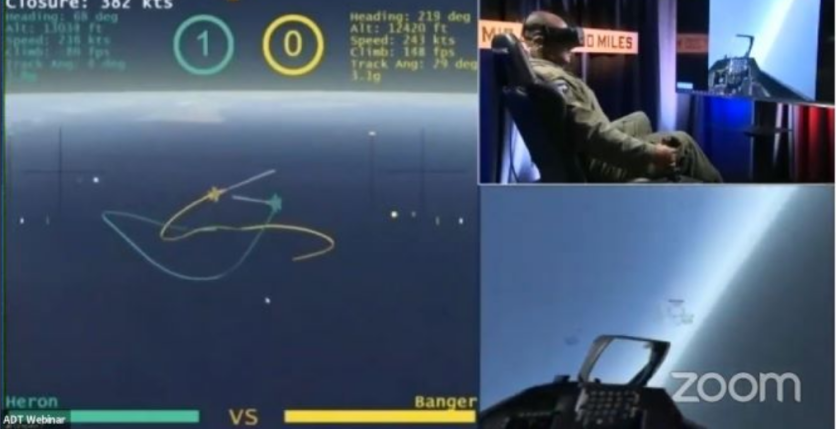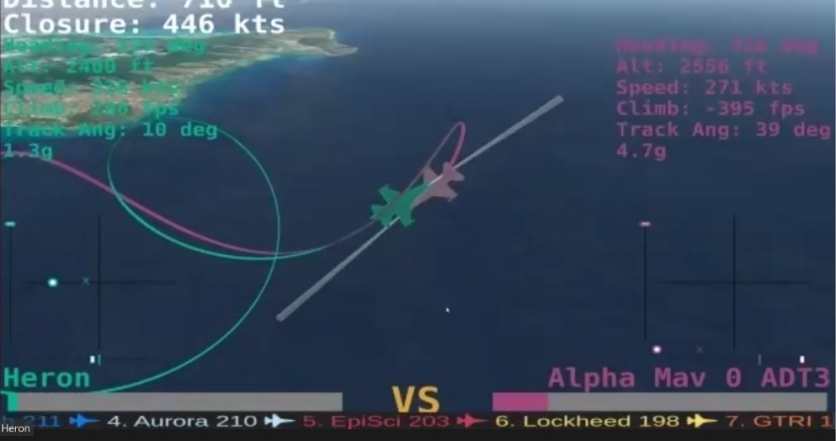DARPA's AlphaDogfight trial's last round revealed that artificial intelligence (AI) could beat a human mind, specifically when it comes to air combat. Heron System's AI won the shootout against a human F-16 pilot. The AI pilot also defeated another fellow AI, which was developed by Lockheed.

The AlphaDogfight Trials have concluded! Congratulations to Heron Systems whose AI agent won the championship among the systems competitors and then beat our F-16 pilot in five straight simulated dogfights in the man-vs-machine finale. The event is here: https://t.co/MRvwUmpgj6 pic.twitter.com/ad47YvMe5Z — DARPA (@DARPA) August 20, 2020
The virtual air-combat limited the use of the fighter jets' other weapons, restricting the players to use only the nose cannon of the aircraft. The human F-16 pilot entered the battle wearing a Virtual Reality (VR) helmet, after the AI vs AI matches.
Also Read : Elon Musk's Neuralink Brain Chip Will Soon Allow Users to Take Charge of Moods and Emotions
Although the anonymous pilot was able to survive significantly longer in the final round by changing tactics and strategies, Heron System's AI pilot defeated the human operator with a 5-0 standing. According to Defense One's latest report, this is not the first time that an AI outperformed a human fighter pilot in a virtual contest.
In 2016, an AI-agent called "Alpha" was revealed to have the ability to win against an experienced human combat flight instructor. The latest competition was arguably more significant since there are a variety of AI agents competing against each other, and then against a human in a highly structured framework.
Ben Bell, the senior machine learning engineer at Heron Systems, said that the fight was a little bit unfair since the AIs were not allowed to learn from their previous experiences. However, it didn't limit the potential of AIs to defeat a human operator.
"The standard things that we do as fighter pilots aren't working," said Banger, the anonymous human pilot.
How the AI pilot defeated the experienced human flight operator
During the final round of the virtual air contest, the commentators said that the AI's "superhuman" aiming ability provided the technology with an edge, even as the simulated F-16s flew low the ground at high speed and would've experienced extreme G forces.

@HeronSystems sits atop the leaderboard after day 1 of the #alphadogfight finals, followed by @physicsai
and @soartech. Tomorrow, 8 teams battle each other for a chance at the championship round on Thursday and then to fight against an F-16 fighter pilot. https://t.co/ufjeFQEAMm pic.twitter.com/YfJknnVYvu — DARPA (@DARPA) August 18, 2020
The artificial intelligence systems mostly rely on deep reinforcement learning. The AIs were trained as they do their tasks repeatedly in a virtual environment. Heron Systems developers released a Q and A video in YouTube, answering some questions and explaining the technology's behaviour during the virtual shootout.
The AI's developer said that it is capable of performing, even without real-time image recognition, on something as small as an NVIDIA Tegra chip.
For more news updates about AI development and other innovations, always keep your tabs open here at TechTimes.
This article is owned by TechTimes,
Written by: Giuliano de Leon.
![Apple Watch Series 10 [GPS 42mm]](https://d.techtimes.com/en/full/453899/apple-watch-series-10-gps-42mm.jpg?w=184&h=103&f=9fb3c2ea2db928c663d1d2eadbcb3e52)



